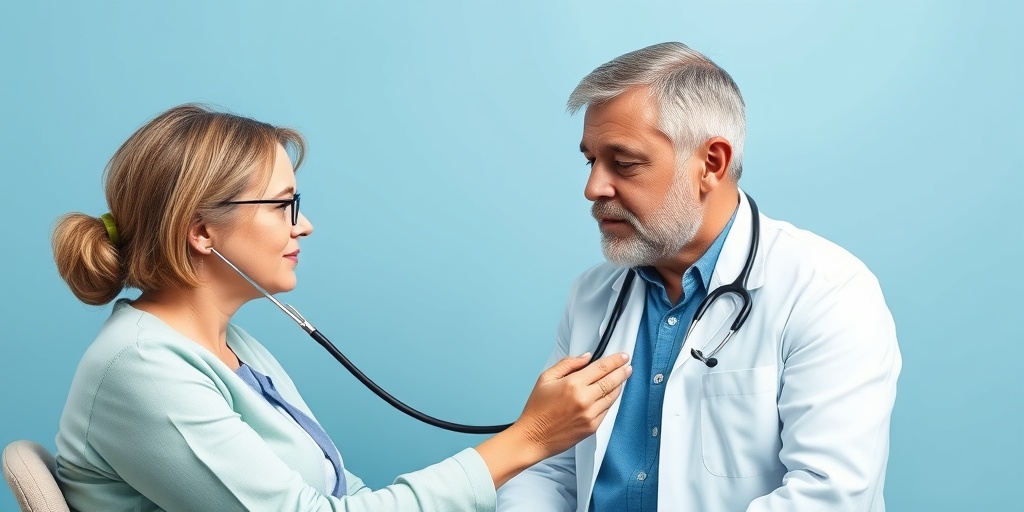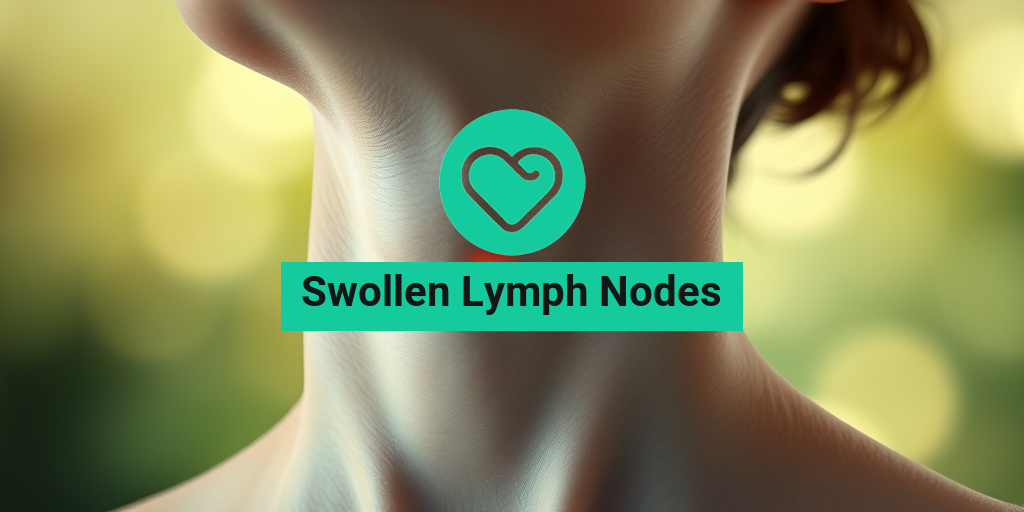What Are Lymph Nodes?
Lymph nodes are small, bean-shaped structures that play a crucial role in your body’s immune system. They are part of the lymphatic system, which helps to filter harmful substances and fight infections. You can find lymph nodes throughout your body, including in your neck, armpits, and groin. Each node contains lymphocytes, a type of white blood cell that helps to identify and destroy pathogens like bacteria and viruses.
The Role of Lymph Nodes in the Immune System
Lymph nodes act as filters for the lymphatic fluid that circulates throughout your body. When your body detects an infection or disease, lymph nodes can become active, producing more lymphocytes to combat the threat. This process can lead to the swelling of lymph nodes, which is often a sign that your body is fighting off an infection.
Common Locations of Lymph Nodes
While lymph nodes are distributed throughout the body, some common areas where they can be found include:
- Neck: Lymph nodes in this area can swell due to infections like colds or strep throat.
- Armpits: Swollen lymph nodes in the armpit may indicate infections in the arms or breasts.
- Groin: Lymph nodes in the groin can swell due to infections in the lower body or sexually transmitted infections.
Understanding the function and location of lymph nodes can help you recognize when something might be wrong, especially if you notice swollen lymph nodes in any of these areas.
Swollen Lymph Nodes Symptoms
When lymph nodes become swollen, it can be a sign that your body is responding to an infection or other health issue. Recognizing the symptoms associated with swollen lymph nodes is essential for understanding your health. Here are some common symptoms to look out for:
Physical Symptoms
Swollen lymph nodes can manifest in various ways, including:
- Swelling: The most obvious symptom is the noticeable enlargement of lymph nodes, which can feel like small lumps under the skin.
- Pain or Tenderness: Swollen lymph nodes may be painful to the touch or tender, especially if they are inflamed due to an infection.
- Redness or Warmth: In some cases, the skin over the swollen lymph nodes may appear red or feel warm.
Associated Symptoms
In addition to the physical symptoms, swollen lymph nodes may accompany other signs of illness, such as:
- Fever: A common response to infection, fever can occur alongside swollen lymph nodes.
- Fatigue: Feeling unusually tired or weak can be a sign that your body is fighting off an infection.
- Night Sweats: Some individuals may experience excessive sweating at night when dealing with infections.
- Weight Loss: Unexplained weight loss can occur in more severe cases, especially if the swelling is due to a chronic condition.
When to Seek Medical Attention
While swollen lymph nodes are often harmless and resolve on their own, there are times when you should seek medical attention. If you experience any of the following, it’s essential to consult a healthcare professional:
- Swelling that lasts more than two weeks
- Swollen lymph nodes that are hard or fixed in place
- Accompanied by persistent fever, night sweats, or unexplained weight loss
Understanding the symptoms of swollen lymph nodes can empower you to take charge of your health. If you have concerns or need more information, consider visiting Yesil Health AI for evidence-based health answers. Your health is important, and being informed is the first step towards wellness! 🌟

Common Causes of Swollen Lymph Nodes
Swollen lymph nodes, also known as lymphadenopathy, can be a common occurrence and often indicate that your body is fighting off an infection or illness. Understanding the common causes of swollen lymph nodes can help you identify when to seek medical attention. Here are some of the most prevalent reasons:
Infections
One of the primary reasons for swollen lymph nodes is infections. These can be viral, bacterial, or fungal in nature. Some common infections that can lead to lymph node swelling include:
- Viral Infections: Conditions like the common cold, influenza, and mononucleosis can cause lymph nodes to swell.
- Bacterial Infections: Bacterial infections such as strep throat or skin infections can also lead to swollen lymph nodes.
- Fungal Infections: Less commonly, fungal infections can cause lymphadenopathy.
Autoimmune Diseases
Autoimmune diseases occur when the immune system mistakenly attacks healthy cells. Conditions such as lupus and rheumatoid arthritis can lead to swollen lymph nodes as the body’s immune response is activated.
Cancers
In some cases, swollen lymph nodes can be a sign of cancer. Lymphoma, leukemia, and metastasis from other cancers can cause lymph nodes to enlarge. If you notice persistent swelling, especially if accompanied by other symptoms like unexplained weight loss or night sweats, it’s crucial to consult a healthcare professional.
Medications and Vaccinations
Some medications and vaccines can cause lymph nodes to swell as a side effect. For example, the COVID-19 vaccine has been known to cause temporary swelling in lymph nodes, particularly in the armpit area. This is usually a normal response as your body builds immunity.
Localized Swelling
Sometimes, swollen lymph nodes can be localized to specific areas of the body, such as:
- Swollen Lymph Nodes in the Armpit: Often related to infections in the arm or breast.
- Swollen Lymph Nodes in the Groin: This can indicate infections in the lower body or sexually transmitted infections.
- Swollen Lymph Nodes in the Neck: Commonly associated with throat infections or dental issues.
Swollen Lymph Nodes in Children
When it comes to children, swollen lymph nodes can be particularly concerning for parents. However, it’s important to remember that lymphadenopathy in children is often a normal response to infections. Here’s what you need to know:
Common Infections in Children
Children are more susceptible to infections due to their developing immune systems. Some common infections that can cause swollen lymph nodes in children include:
- Ear Infections: These can lead to swelling in the lymph nodes near the ears.
- Strep Throat: A bacterial infection that often results in swollen lymph nodes in the neck.
- Viral Infections: Conditions like chickenpox or hand, foot, and mouth disease can also cause lymph node swelling.
When to Seek Medical Attention
While swollen lymph nodes in children are often harmless, there are certain situations where you should seek medical advice:
- If the swelling lasts more than two weeks.
- If the lymph nodes are hard, fixed, or growing rapidly.
- If your child experiences fever, night sweats, or unexplained weight loss.
Home Care and Treatment
In most cases, swollen lymph nodes in children will resolve on their own as the underlying infection clears up. Here are some home care tips:
- Rest: Ensure your child gets plenty of rest to help their body fight off the infection.
- Hydration: Encourage your child to drink fluids to stay hydrated.
- Warm Compress: Applying a warm compress to the swollen area can provide relief.
Understanding the causes and implications of swollen lymph nodes can empower you to take appropriate action when necessary. If you have concerns about swollen lymph nodes, whether in yourself or your child, don’t hesitate to consult a healthcare professional for guidance. 🩺

When to See a Doctor
Swollen lymph nodes can be a common occurrence, often indicating that your body is fighting off an infection. However, there are specific situations where you should seek medical attention. Understanding when to see a doctor can help you address potential health issues early on.
Signs That Warrant a Doctor’s Visit
If you notice any of the following symptoms accompanying your swollen lymph nodes, it’s essential to consult a healthcare professional:
- Persistent Swelling: If your lymph nodes remain swollen for more than two weeks, it’s time to get checked out.
- Fever: A high fever, especially if it’s persistent, can indicate a more serious infection.
- Night Sweats: Experiencing excessive sweating at night can be a sign of underlying health issues.
- Unexplained Weight Loss: Losing weight without trying can be a red flag that should not be ignored.
- Difficulty Breathing or Swallowing: If swollen lymph nodes are causing discomfort in your throat or chest, seek immediate medical attention.
- Hard or Fixed Lymph Nodes: If the swollen lymph nodes feel hard or are fixed in place, this could indicate a more serious condition.
In particular, swollen lymph nodes in the neck on one side or under the jaw can be concerning, especially if accompanied by other symptoms. If you have swollen lymph nodes in the groin, especially in males, and experience pain or discomfort, it’s advisable to consult a doctor as well.
Understanding Your Risk Factors
Certain factors can increase your risk of developing serious conditions associated with swollen lymph nodes. These include:
- Age: Older adults may be at a higher risk for certain cancers.
- Immune System Status: Individuals with weakened immune systems, such as those with HIV, should be vigilant about swollen lymph nodes.
- Recent Infections: If you’ve recently had an infection, monitor your lymph nodes closely.
Being aware of these risk factors can help you make informed decisions about your health and when to seek medical advice. 🩺
Diagnosis of Swollen Lymph Nodes
When you visit a healthcare provider for swollen lymph nodes, they will conduct a thorough evaluation to determine the underlying cause. Here’s what you can expect during the diagnostic process.
Initial Assessment
Your doctor will start with a detailed medical history and physical examination. They will ask questions such as:
- How long have the lymph nodes been swollen?
- Are there any accompanying symptoms, like fever or weight loss?
- Have you had any recent infections or illnesses?
This initial assessment is crucial for narrowing down potential causes of the swelling. For instance, swollen lymph nodes behind the ear or in the throat may suggest a localized infection.
Diagnostic Tests
Depending on the findings from your initial assessment, your doctor may recommend further tests, including:
- Blood Tests: These can help identify infections, immune disorders, or blood cancers.
- Imaging Tests: Ultrasounds, CT scans, or MRIs may be used to get a clearer picture of the lymph nodes and surrounding tissues.
- Biopsy: In some cases, a small sample of tissue may be taken from the swollen lymph node to check for cancer or other diseases.
These diagnostic tests are essential for determining the exact cause of swollen lymph nodes and guiding appropriate treatment. If you have swollen lymph nodes due to an infection, your doctor may prescribe antibiotics or other medications to help you recover. 💊
Understanding the diagnostic process can alleviate some anxiety associated with swollen lymph nodes. Remember, early detection and treatment are key to managing any underlying health issues effectively.

Treatment Options for Swollen Lymph Nodes
Swollen lymph nodes can be a source of concern for many individuals, often indicating an underlying health issue. Understanding the treatment options available is crucial for effective management. Here, we explore various approaches to treating swollen lymph nodes, depending on their cause.
Medical Treatments
When swollen lymph nodes are a result of an infection or other medical conditions, seeking professional medical treatment is essential. Here are some common medical interventions:
- Antibiotics: If the swelling is due to a bacterial infection, your doctor may prescribe antibiotics to help eliminate the infection.
- Antivirals: For viral infections, antiviral medications may be recommended, especially in cases like HIV or other viral illnesses.
- Corticosteroids: These medications can help reduce inflammation and swelling, particularly in autoimmune conditions.
- Surgery: In rare cases, if lymph nodes are persistently swollen or suspected to be cancerous, surgical removal may be necessary.
Over-the-Counter Medications
For mild cases of swollen lymph nodes, over-the-counter (OTC) medications can provide relief:
- Pain relievers: Nonsteroidal anti-inflammatory drugs (NSAIDs) like ibuprofen or acetaminophen can help alleviate pain and reduce swelling.
- Warm compresses: Applying a warm compress to the affected area can soothe discomfort and promote circulation.
When to See a Doctor
While many cases of swollen lymph nodes resolve on their own, it’s important to know when to seek medical attention. You should consult a healthcare professional if:
- The swelling persists for more than two weeks.
- You experience severe pain or tenderness.
- There are accompanying symptoms such as fever, night sweats, or unexplained weight loss.
- The swollen lymph nodes are hard or fixed in place.
Home Remedies and Care Tips
In addition to medical treatments, several home remedies can help manage swollen lymph nodes and promote healing. These remedies can be particularly effective for mild cases or as complementary treatments.
Natural Remedies
- Hydration: Staying well-hydrated is crucial. Drink plenty of fluids, such as water, herbal teas, and broths, to help your body fight off infections.
- Herbal teas: Teas made from ginger, chamomile, or peppermint can provide soothing effects and may help reduce inflammation.
- Turmeric: Known for its anti-inflammatory properties, turmeric can be consumed in food or as a supplement to help reduce swelling.
Self-Care Practices
Incorporating self-care practices into your routine can also aid in recovery:
- Rest: Ensure you get adequate rest to allow your body to heal.
- Warm compresses: As mentioned earlier, applying a warm compress can help alleviate discomfort and promote healing.
- Gentle massage: Gently massaging the area around the swollen lymph nodes can improve circulation and reduce tension.
Dietary Considerations
Eating a balanced diet rich in vitamins and minerals can support your immune system. Consider incorporating:
- Fruits and vegetables: Foods high in antioxidants, such as berries, spinach, and citrus fruits, can help boost your immune response.
- Lean proteins: Chicken, fish, and legumes provide essential nutrients for recovery.
- Probiotics: Foods like yogurt and fermented vegetables can promote gut health, which is linked to overall immunity.
By combining medical treatments with home remedies and self-care practices, you can effectively manage swollen lymph nodes and support your body’s healing process. Remember, if symptoms persist or worsen, it’s essential to consult a healthcare professional for further evaluation. 🌿💧

Frequently Asked Questions about Swollen Lymph Nodes
What are swollen lymph nodes?
Swollen lymph nodes are enlarged lymphatic tissues that can occur in various parts of the body, including the neck, armpits, and groin. They often indicate that the body is fighting an infection or other medical condition.
What causes swollen lymph nodes?
There are several potential causes for swollen lymph nodes, including:
- Infections: Bacterial or viral infections are the most common causes.
- Immune responses: Conditions like autoimmune diseases can lead to lymph node swelling.
- Cancers: Certain cancers, such as lymphoma or leukemia, can cause lymph nodes to enlarge.
How can I tell if my swollen lymph nodes are serious?
If your swollen lymph nodes are persistent, painful, or accompanied by other symptoms like fever, night sweats, or unexplained weight loss, it is important to consult a healthcare professional for further evaluation.
Where can swollen lymph nodes occur?
Swollen lymph nodes can occur in various locations, including:
- Armpit: Swollen lymph nodes in the armpit can indicate infections or other conditions.
- Groin: Swollen lymph nodes in the groin area may be related to infections or other health issues.
- Neck: Swollen lymph nodes in the neck, especially on one side, are common during infections.
- Under the jaw: Lymph nodes under the jaw can swell due to dental issues or infections.
- Behind the ear: Swelling in this area may indicate an ear infection or other conditions.
What are the treatment options for swollen lymph nodes?
Treatment for swollen lymph nodes depends on the underlying cause. Common approaches include:
- Observation: If the swelling is due to a minor infection, it may resolve on its own.
- Medications: Antibiotics may be prescribed for bacterial infections.
- Management of underlying conditions: Treating the root cause, such as an autoimmune disease or cancer, is essential.
Can swollen lymph nodes be a sign of HIV?
Yes, swollen lymph nodes can be a symptom of HIV infection, particularly during the acute phase. If you suspect exposure to HIV or experience other symptoms, it is crucial to seek medical advice and testing.
When should I see a doctor?
You should consult a healthcare professional if:
- Your swollen lymph nodes persist for more than two weeks.
- You experience severe pain or tenderness.
- There are accompanying symptoms like fever, night sweats, or unexplained weight loss.
Can swollen lymph nodes go away on their own?
In many cases, swollen lymph nodes can resolve on their own, especially if they are caused by a mild infection. However, if they persist or worsen, it is advisable to seek medical attention.
Are there any home remedies for swollen lymph nodes?
While it’s essential to consult a healthcare provider for persistent swelling, some home remedies may help alleviate discomfort:
- Warm compress: Applying a warm compress can help reduce pain and swelling.
- Hydration: Staying well-hydrated supports your immune system.
- Rest: Allowing your body to rest can aid in recovery.
If you have further questions or concerns about swollen lymph nodes, don’t hesitate to reach out to a healthcare professional for personalized advice. 😊




